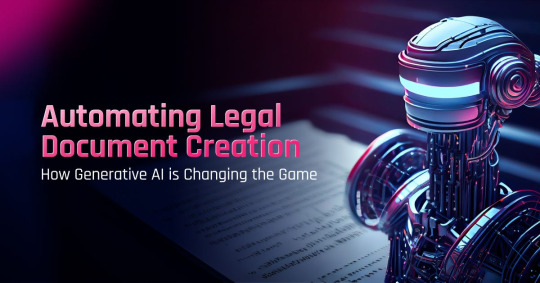Don't wanna be here? Send us removal request.
Text
Lawyers of Tomorrow: Adapting to Generative AI in Legal Practice

As the legal landscape continues to evolve in the digital age, the integration of artificial intelligence (AI) technologies has become increasingly prevalent. Among these advancements, generative AI stands out as a transformative tool reshaping traditional legal practice. From drafting contracts to conducting legal research, generative AI is revolutionizing the way lawyers work. However, its adoption also poses challenges and opportunities that lawyers must navigate to thrive in this new era.
Generative AI, a subset of artificial intelligence, refers to systems capable of producing human-like outputs, such as text, images, or even music, based on input data and patterns learned from it. In the legal field, generative AI holds immense potential across various areas of practice, including drafting legal documents, analyzing case law, and predicting case outcomes.
One of the most significant impacts of generative AI in legal practice is its ability to streamline and enhance the drafting process. Traditionally, drafting legal documents such as contracts, briefs, and pleadings required extensive manual labor, often involving repetitive tasks and meticulous attention to detail. However, with the advent of generative AI tools, lawyers can now automate many aspects of the drafting process, saving time and reducing the risk of errors.
For example, generative AI platforms equipped with natural language processing capabilities can analyze large volumes of legal texts and extract relevant clauses or provisions to assist lawyers in drafting contracts. These tools not only accelerate the drafting process but also help ensure consistency and compliance with legal standards.
Moreover, generative AI can augment lawyers' research capabilities by rapidly analyzing vast amounts of case law and legal precedent. By identifying relevant cases, statutes, and regulations, these AI-powered tools enable lawyers to conduct comprehensive legal research more efficiently and effectively than ever before.
Additionally, generative AI holds promise in predicting case outcomes based on historical data and patterns. By analyzing factors such as case facts, judicial decisions, and legal arguments, these predictive models can provide valuable insights to lawyers, helping them assess the strengths and weaknesses of their cases and develop more informed litigation strategies.
However, despite its transformative potential, the integration of generative AI into legal practice presents challenges that lawyers must address. One such challenge is ensuring the accuracy and reliability of AI-generated outputs. While generative AI systems can produce human-like text, there is always a risk of errors or biases creeping into the output, especially when dealing with complex legal concepts and nuances.
Moreover, concerns about data privacy and security are paramount in the legal profession, given the sensitive nature of legal information. Lawyers must carefully vet AI technologies to ensure compliance with legal and ethical standards regarding data protection and confidentiality.
Furthermore, the widespread adoption of generative AI in legal practice raises questions about its impact on the future of the legal profession. Some fear that AI technologies may replace human lawyers altogether, leading to job displacement and deskilling of legal professionals. However, while generative AI undoubtedly changes the nature of legal work, it also presents new opportunities for lawyers to enhance their skills and adapt to the evolving demands of the profession.
In navigating the challenges and opportunities presented by generative AI, lawyers must embrace a mindset of continuous learning and adaptation. Rather than fearing automation, lawyers should leverage AI technologies to augment their capabilities and deliver greater value to their clients. This may involve acquiring new technical skills related to AI and data analysis, as well as honing soft skills such as critical thinking, creativity, and communication.
Moreover, lawyers must remain vigilant about the ethical implications of AI in legal practice. As stewards of justice, lawyers have a responsibility to ensure that AI technologies are used ethically and responsibly, without perpetuating biases or undermining fundamental principles of fairness and equality.
In conclusion, generative AI represents a paradigm shift in the legal profession, offering unprecedented opportunities for efficiency, innovation, and growth. By embracing AI technologies and adapting to the changing landscape of legal practice, lawyers can position themselves as leaders in the digital age and continue to serve their clients effectively in an increasingly complex and dynamic legal environment.
0 notes
Text
The Evolution of AI in the Legal Industry

In the ever-evolving landscape of the legal industry, artificial intelligence (AI) has emerged as a game-changer, revolutionizing the way legal professionals operate. AI technologies, such as natural language processing and machine learning, are streamlining legal research, contract analysis, and case management processes. By swiftly analyzing vast datasets, AI tools enable lawyers to extract valuable insights, identify patterns, and make data-driven decisions with unprecedented efficiency.
Moreover, AI-powered legal software is enhancing client service delivery, providing faster response times, and improving the overall client experience. Chatbots equipped with AI capabilities are facilitating round-the-clock assistance, answering queries, and guiding clients through legal procedures.
However, with these advancements come challenges, including concerns about data privacy, algorithmic bias, and the ethical use of AI in legal practice. It's crucial for legal professionals to navigate these challenges responsibly, ensuring that AI technologies are deployed ethically and in compliance with regulatory standards.
Overall, the integration of AI in the legal industry marks a significant shift towards innovation and efficiency, empowering legal professionals to deliver high-quality services in a rapidly changing digital landscape. As AI continues to evolve, its role in shaping the future of law cannot be overstated.
1 note
·
View note